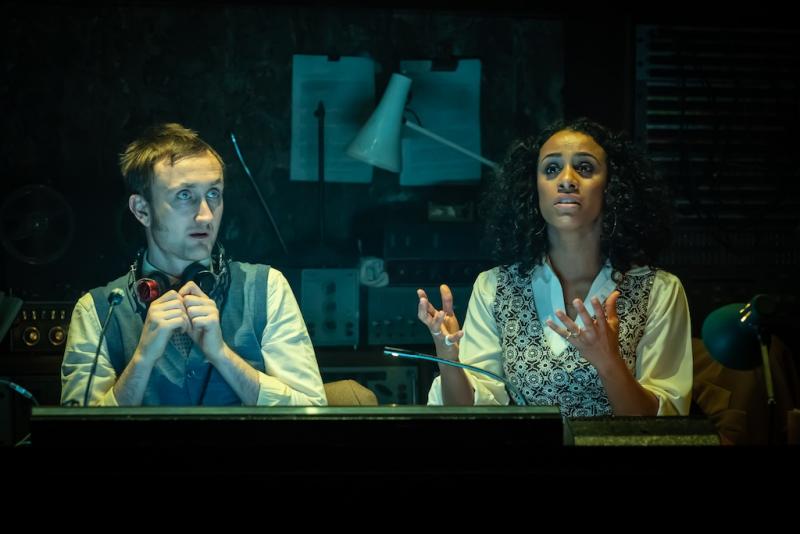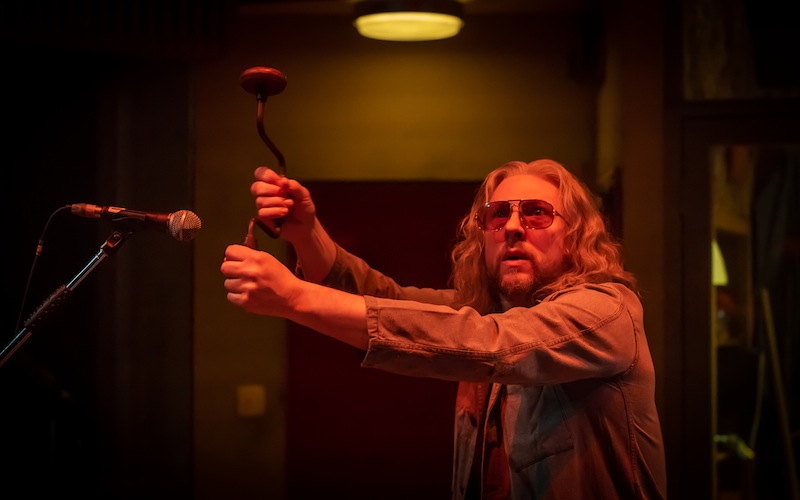Berberian Sound Studio, Donmar Warehouse review – improves the original | reviews, news & interviews
Berberian Sound Studio, Donmar Warehouse review – improves the original
Berberian Sound Studio, Donmar Warehouse review – improves the original
This dark comedy raises disturbing questions about sound and intimacy

Two men called "Massimo" face the audience, one very tall, one very, well, minimo. The tall Massimo (Tom Espiner, pictured below) sports wavy shoulder length blond hair and an exuberant pearl rosary, the minimo Massimo (Hemi Yeroham) has dark hair, a beard and glasses, and intense stare.
It’s the moment in this dynamic reconstruction of Peter Strickland’s acclaimed 2012 movie Berberian Sound Studio (which starred Toby Jones) that you realise, with some relief on this critic’s part, how different this Donmar Warehouse stage version is going to be. Here Tom Brooke (who made his name on stage as the doltish Lee in Jerusalem, and on TV as damaged war veteran Andy Apsted in Bodyguard) plays the geekish Gilderoy, a sound engineer invited to create effects for an Italian movie. As in the movie, Joel Horwood and Tom Scutt’s recreation raises sophisticated questions about the way that sound can distort reality and create its own universe, as Gilderoy – who initially thinks he is working on a film about horses - is drawn into the horror world that he’s so unwillingly evoking. Yet where the original plays disturbingly with the Italian giallo’s sadistic obsession with violence against women, so that Gilderoy himself becomes horrifyingly complicit, here his angst is turned against himself. If that doesn’t sound like a barrel of laughs, it isn’t, but Scutt, in his debut as a director, skilfully amplifies the comedy of the film, which has the dual effect of both making this more entertaining, and creating an intelligent distance from its most disturbing elements. To watch the film and then this production is to realise quite how great the change is wrought by the #MeToo movement. Where, in 2012, a strikingly original script could get away with recreating erotically-motivated violence against women by simultaneously condemning it, now we can see it’s not acceptable to portray that violence at any level. Society has grown up, so what we have here instead is a script that raises disturbing questions about sound and intimacy filtered through dark comedy that steers an ambitious course between Alan Partridge and Krapp’s Last Tape.
If that doesn’t sound like a barrel of laughs, it isn’t, but Scutt, in his debut as a director, skilfully amplifies the comedy of the film, which has the dual effect of both making this more entertaining, and creating an intelligent distance from its most disturbing elements. To watch the film and then this production is to realise quite how great the change is wrought by the #MeToo movement. Where, in 2012, a strikingly original script could get away with recreating erotically-motivated violence against women by simultaneously condemning it, now we can see it’s not acceptable to portray that violence at any level. Society has grown up, so what we have here instead is a script that raises disturbing questions about sound and intimacy filtered through dark comedy that steers an ambitious course between Alan Partridge and Krapp’s Last Tape.
Brooke is never less than compelling in his assertive dweebishness – as deftly assured when it comes to the technical flourishes of mixing sound as he is unassured in issues of sentiment and his own sexuality. His extraordinary face alone presents a masterclass in repressed emotion: the eyes glistening intensely like small pools of water, the chin jutting more defiantly the more he is oppressed by what’s going on around him. In a wonderful innovation, where, in the film, we see the letter his mother has written to him, here, he has taught her to record her letters on old-fashioned spools of tape. This means that when she talks about the nesting chiff-chaffs we can hear the birdsong, and watch his face as it spirits him back home to an altogether more innocent universe.
Tom Espiner’s (above) involvement in this production (for which he has designed the sound together with Ben and Max Ringham) brings with it the legacy of all his work with Sound and Fury, the sound-based theatre company he co-founded with his brother Mark Espiner and Dan Jones. This seems at least partly accountable for the fact that the play is, on one level, an utterly fascinating disquisition on the tricks and techniques of recording sound, and the way such techniques play with the mind. Being a story about a geek, technical detail is king here, and as with the original, it fetishises the equipment used for film in the pre-digital era. This means that certain lines still resonate wonderfully: when Gilderoy is having problems remembering the names of humans, he’s told to think of them as if they are microphones. In one of the best jokes of the script, when the mysterious, sadistic Santini asks Gilderoy if he believes in God, Gilderoy snaps back "Don’t get technical" – making it clear that in a world where concepts like emotion or religion are fiendishly complicated for him, sound technology has become his faith.
Aside from the brilliantly original improvisations of the two Massimos, there are strong subtly comedic performances from Lara Rossi as Silvia and Beatrice Cirocchi as Carla. Enzo Cilenti has a harder task in making the slimily misogynistic Francesco three dimensional, but he tackles the role valiantly. This is a challenging evening on many levels, both for its themes, and its shift from provocative comedy to psychologically warped horror. You emerge with no easy answers, but like the reverb of a microphone, it will continue to assail your mind from unexpected angles for some time afterwards.
- Berberian Sound Studio at the Donmar Warehouse until 30 March
- More theatre reviews on theartsdesk
rating
Explore topics
Share this article
The future of Arts Journalism
You can stop theartsdesk.com closing!
We urgently need financing to survive. Our fundraising drive has thus far raised £49,000 but we need to reach £100,000 or we will be forced to close. Please contribute here: https://gofund.me/c3f6033d
And if you can forward this information to anyone who might assist, we’d be grateful.

Subscribe to theartsdesk.com
Thank you for continuing to read our work on theartsdesk.com. For unlimited access to every article in its entirety, including our archive of more than 15,000 pieces, we're asking for £5 per month or £40 per year. We feel it's a very good deal, and hope you do too.
To take a subscription now simply click here.
And if you're looking for that extra gift for a friend or family member, why not treat them to a theartsdesk.com gift subscription?
more Theatre
 Ragdoll, Jermyn Street Theatre review - compelling and emotionally truthful
Katherine Moar returns with a Patty Hearst-inspired follow up to her debut hit 'Farm Hall'
Ragdoll, Jermyn Street Theatre review - compelling and emotionally truthful
Katherine Moar returns with a Patty Hearst-inspired follow up to her debut hit 'Farm Hall'
 Troilus and Cressida, Globe Theatre review - a 'problem play' with added problems
Raucous and carnivalesque, but also ugly and incomprehensible
Troilus and Cressida, Globe Theatre review - a 'problem play' with added problems
Raucous and carnivalesque, but also ugly and incomprehensible
 Clarkston, Trafalgar Theatre review - two lads on a road to nowhere
Netflix star, Joe Locke, is the selling point of a production that needs one
Clarkston, Trafalgar Theatre review - two lads on a road to nowhere
Netflix star, Joe Locke, is the selling point of a production that needs one
 Ghost Stories, Peacock Theatre review - spirited staging but short on scares
Impressive spectacle saves an ageing show in an unsuitable venue
Ghost Stories, Peacock Theatre review - spirited staging but short on scares
Impressive spectacle saves an ageing show in an unsuitable venue
 Hamlet, National Theatre review - turning tragedy to comedy is no joke
Hiran Abeyeskera’s childlike prince falls flat in a mixed production
Hamlet, National Theatre review - turning tragedy to comedy is no joke
Hiran Abeyeskera’s childlike prince falls flat in a mixed production
 Rohtko, Barbican review - postmodern meditation on fake and authentic art is less than the sum of its parts
Łukasz Twarkowski's production dazzles without illuminating
Rohtko, Barbican review - postmodern meditation on fake and authentic art is less than the sum of its parts
Łukasz Twarkowski's production dazzles without illuminating
 Lee, Park Theatre review - Lee Krasner looks back on her life as an artist
Informative and interesting, the play's format limits its potential
Lee, Park Theatre review - Lee Krasner looks back on her life as an artist
Informative and interesting, the play's format limits its potential
 Measure for Measure, RSC, Stratford review - 'problem play' has no problem with relevance
Shakespeare, in this adaptation, is at his most perceptive
Measure for Measure, RSC, Stratford review - 'problem play' has no problem with relevance
Shakespeare, in this adaptation, is at his most perceptive
 The Importance of Being Earnest, Noël Coward Theatre review - dazzling and delightful queer fest
West End transfer of National Theatre hit stars Stephen Fry and Olly Alexander
The Importance of Being Earnest, Noël Coward Theatre review - dazzling and delightful queer fest
West End transfer of National Theatre hit stars Stephen Fry and Olly Alexander
 Get Down Tonight, Charing Cross Theatre review - glitz and hits from the 70s
If you love the songs of KC and the Sunshine Band, Please Do Go!
Get Down Tonight, Charing Cross Theatre review - glitz and hits from the 70s
If you love the songs of KC and the Sunshine Band, Please Do Go!
 Punch, Apollo Theatre review - powerful play about the strength of redemption
James Graham's play transfixes the audience at every stage
Punch, Apollo Theatre review - powerful play about the strength of redemption
James Graham's play transfixes the audience at every stage
 The Billionaire Inside Your Head, Hampstead Theatre review - a map of a man with OCD
Will Lord's promising debut burdens a fine cast with too much dialogue
The Billionaire Inside Your Head, Hampstead Theatre review - a map of a man with OCD
Will Lord's promising debut burdens a fine cast with too much dialogue

Add comment